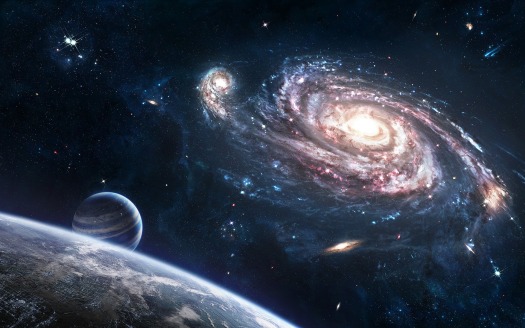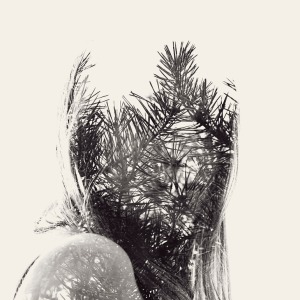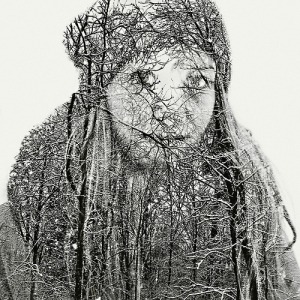What does it mean to be a monster in a Whiteheadian universe? A world in which “the holy idea of process”[1] pervades, and all beings are defined in relationship to each other. A world in which God is unconscious and yet able to see all Time and Space, who gives limit and also meaning through infinite patience, a God who may indeed even be a dragon. “Seek out gold and sit on it.”[2] Infinitely patient, eternally growing with the accumulation of the experience of all lowly creatures, God becomes a creature himself bound within the immanent sphere of Time. How does one define oneself in such a world? How to know thyself when there is “No thread, no frailest hair between myself and the universal clutter”[3]?

Beowulf is a poetic elegy of heroism, written by an unknown Anglo-Saxon imagination, which we have inherited from Europe’s Dark Ages. “Not that one age is darker than another,”[4] as a post-modern dragon proclaims. The novelist John Gardner has taken this Medieval text and offered it from a new perspective: the man-eating monster Grendel, whom the hero Beowulf defeats in his first battle, tells us his own story of how he came to be who he is. Gardner’s tale is woven of the post-modern philosophies existentialism and nihilism, framing Grendel’s solipsistic view of a disenchanted, mechanistic universe devoid of all meaning. Yet the narrative is also richly saturated with the thought, and even direct quotations of, the process philosopher Alfred North Whitehead, whose voice speaks through a worm from the ancient world, as well as an old priest enraptured with his musings on God, but also through each scene of the story’s unfolding.
It may be that Gardner was able to write Grendel’s tale through a Whiteheadian lens because something of Whitehead’s thought was already present in the original poem of Beowulf, although written some ten to thirteen centuries before Whitehead was ever born. Through Grendel one can begin to see glimpses in Beowulf of prehension and concrescence captured in narrative form, long before they were ever named as philosophical concepts. This study of ancient myth, imaginative poetry, and process philosophy is an exploration in which cause and effect are not dependent upon time, in which the hero’s final defeat can illustrate concrescence, Whitehead’s prehension can illuminate Grendel’s monstrosity, and Gardner’s dragon can give metaphor to the contemporary practice of creating concepts without images, and the dangerous bridges we may walk to understand them.
Grendel woke up in a mechanistic universe, to paraphrase John McDermott.[5] He contemplates the indifference of his world, the “cold mechanics of the stars.”[6] All things are inanimate to him, religion is lunatic, he is vastly alone, isolated. “Space hurls outward, falconswift, mounting like an irreversible injustice, a final disease.”[7] Yet, like so many “terrified by the eternal silence of these infinite spaces,”[8] Grendel seeks out meaning, even as he denies its existence: “Stars, spattered out through lifeless night from end to end, like jewels scattered in a dead king’s grave, tease, torment my wits toward meaningful patterns that do not exist.”[9]
It is as this post-modern “meaning-seeking speck of dust”[10] that Grendel has his first crisis of meaning, in which he sees the living values of what he thought of as the inanimate world. While trapped painfully between two trees, Grendel searches the landscape in vain for his mother, and the objects of the world each present themselves to him.
I twisted around as far as I could, hunting wildly for her shape on the cliffs, but there was nothing, or rather, there was everything but my mother. Thing after thing tried, cynical and cruel, to foist itself off as my mama’s shape… each thing trying to detach itself, lift itself out of the general meaningless scramble of objects, but falling back, melting to the blank, infuriating clutter of not-my-mother…. I seemed to see the whole universe, even the sun and sky, leaping forward, then sinking away again, decomposing.[11]
Grendel is having a cruel experience of the full presence of everything, a multiplicity of what Whitehead calls prehensions, in which everything is always present in, and creating the relational essence of, all other things. Whitehead writes,
The actual world is a manifold of prehensions; and a ‘prehension’ is a ‘prehensive occasion;’ and a prehensive occasion is the most concrete finite entity, conceived as what it is in itself and for itself, and not as from its aspect in the essence of another such occasion.[12]
Each entity in Grendel’s experience is actively putting itself forward; the objects and Grendel prehend each other, yet Grendel also prehends the absence of his mother—her very absence is a real entity that is defining the essence of each object in Grendel’s experience. “Every occasion is a synthesis of being and not-being.”[13] “Being,” in this case, refers to Grendel’s prehensions of all that is physically present, whereas “not-being” refers to his prehensions of what is only conceptually there as a desirable possibility—his mother.
In the trauma and pain of being caught in the tree, believing he is dying, Grendel is having an enchanted experience of the world that immensely contradicts his belief in a meaningless, inanimate universe. He has lost the ability for negative prehension, the “definite exclusion of that item from positive contribution to the subject’s own real internal constitution.”[14] He cannot filter out any presence; it is utterly overwhelming, this interconnection of all things.
At last Grendel is rescued, hours later, by his mother. As he lies safe within his subterranean cave he contemplates his experience and can only conclude that it was entirely projection: “‘The world resists me and I resist the world’ I said. “That’s all there is. The mountains are what I define them as….The world is all pointless accident… I exist, nothing else.’”[15] Grendel refuses to be changed by his experience. Yet, as he thinks on himself thinking, he comes to a realization: “I observe myself observing what I observe. It startles me. ‘Then I am not that which observes!’ I am lack. Alack! No thread, no frailest hair between myself and the universal clutter!”[16] The interconnectivity that is his essence, without which he is lack, sinks in. He experiences a reversal of Descartes’ Cogito ergo sum. I think therefore I am not. Grendel only exists in relation to the entirety of the universal clutter. Who then is he to be?
It is in this state of existential isolation that Grendel first encounters the Shaper. The Shaper is the name Grendel uses to refer to an old minstrel who has come to entertain the thanes of King Hrothgar beneath the golden eaves of Heorot. The Shaper cannot be allegorically exhausted in Gardner’s rendering. On one level the Shaper is clearly the forgotten Beowulf poet himself. His first lines are explicitly the opening lines of the Medieval poem, translated into English:
Hwæt! We Gar-Dena in gear-dagum,
þeod-cyninga, þrym gefrunon,
hu ða æþelingas ellen fremedon.[17]
Lo, we have heard the honor of the Speardanes,
nation-kings, in days now gone,
how those battle-lords brought themselves glory.[18]
This puts the Shaper simultaneously inside and outside Grendel’s story. He is composing the tale, yet is also a character within it. Yet Grendel outlives him, so the Shaper writing the entirety of the Beowulf poem is an impossibility, as that poem carries on long past Grendel’s own death. The timing of their deaths contradict each other.
Grendel’s desire to find meaning is met by the song of the Shaper, images woven on the weft of his harp strings. “Even to me,” Grendel says, “incredibly, he had made it all seem true and very fine.”[19] He hears the roaring applause, following the song, of “men gone mad on art.”[20]
What was he? The man had changed the world, had torn up the past by its thick, gnarled roots and had transmuted it, and they, who knew the truth, remembered it his way—and so did I.[21]
The Shaper has the ability to create and reshape history with the power of his poetic imagination. J.R.R. Tolkien, arguably the greatest advocate for Beowulf as a work of creative imagination, perceives this ability of the Beowulf poet to make art appear as history. Beowulf was long studied as no more than a historical document, of little artistic or literary significance, until Tolkien shone a new light on its virtues. “The illusion of historical truth and perspective, that has made Beowulf seem such an attractive quarry,” Tolkien writes, “is largely a product of art.”[22] Tolkien tends to use the term art in a highly specific way: Art is what gives an “inner consistency of reality”[23] to a creation of the imagination. Art is what makes the imaginal real, and what gives the Shaper his great powers.
The Shaper of Gardner’s tale has more roles to play than one in Gardner’s Whiteheadian universe, and he may be no mere mortal poet. His ability to reshape history, to imbue it with beauty and meaning, thus inspiring Hrothgar’s people to lead better lives, bears strong resemblance to what Whitehead calls the “consequent nature of God.” Whitehead writes,
God’s role… lies in the patient operation of the overpowering rationality of his conceptual harmonization. He does not create the world, he saves it: or, more accurately, he is the poet of the world, with tender patience leading it by his vision of truth, beauty, and goodness.[24]
This characteristic of the Shaper is what so enchants Grendel, what draws him in with a desire to participate in the poetic image the Shaper weaves. “He takes what he finds,” Grendel says, “And by changing men’s minds he makes the best of it.”[25]
Finally, it is through Whiteheadian scholar Isabelle Stengers’ reading of Grendel that yet another role of the Shaper is revealed: the Shaper may be Whitehead himself in his mode of creating philosophical thought. Stengers writes that Whitehead “conceived philosophical thought as the Shaper himself conceives of history—as fabulation—and who has succeeded in making converge what should have diverged.”[26] Whitehead creates concepts as the Shaper sings his heroic tales: “Whitehead fabricates, composes, constructs—deliberately, technically, artificially—a universe whose facticity and fictional character cannot be denounced, because they are obvious.”[27] The only character in Grendel who can denounce the Shaper is the dragon. He says, “That’s where the Shaper saves them. Provides an illusion of reality—puts together all their facts with a gluey whine of connectedness. Mere tripe, believe me.”[28] The dragon can make such assured insults because he is granted a greater perspective on all existence; yet he too is limited, for he cannot see his own nature, a topic to which we will return.
Grendel is born into the body of a monster, cursed to be misunderstood in his actions at first sight. Thus he truly becomes a monster, choosing to murder viciously and devour crudely, only after this definition has been projected by others upon him. He sees himself as lack ever since he experienced the world as “not-my-mother,” a lack which awaits definition in relationship to others. But his grotesque physical form can only offer him one relationship. Eavesdropping at Hrothgar’s hall, Grendel hears the Shaper tell of the world’s creation by the greatest of gods, followed by a tale of two brothers: one killed the other, splitting the world into dark and light, and God cursed the murderer. As he listens Grendel realizes he is one of the accursed, doomed to darkness. Throughout Beowulf Grendel is often referred to as of Cain’s descent, an indication of the strange mix of early Christianity and northern mythologies that ignited the poet’s imagination.
þanon woc fela
geosceaft-gasta; wæs þæra Grendel sum,
heoro-wearh hetelic.
And from Cain there sprang,
misbegotten spirits, among them Grendel,
the banished and accursed.[29]
Grendel is enchanted by the Shaper’s words. He believes his tales, even as he wishes for them to be untrue. In a fit of religious conversion Grendel rushes down to Heorot calling “Mercy! Peace!”[30] His presence incites fear in Hrothgar’s thanes and they attack the crying beast they believe to be threatening them. Grendel flees. He is saddled with Cain’s guilt before ever committing Cain’s crime. It is this burden that draws him to the dragon.
Premonitions of the dragon’s presence resound throughout the chapters of Grendel that lead up to the dragon’s introduction; whispers of “something deeper, an impression from another mind, some live thing old and terrible.”[31] Grendel begins to sense the dragon more and more as he sinks further into his own darkness and cravings for violence. “I could feel it all around me,” Grendel recalls, “that invisible presence, chilly as the first intimation of death, the dusty unblinking eyes of a thousand snakes.”[32] Grendel’s prehensions of the dragon seem to shift from non-being ever more toward being until finally he stands within the dragon’s presence. Yet it is never made clear if he ever encounters the dragon in the flesh, or whether the dragon always remains a conceptual prehension. Grendel sits in silence feeling an unknown presence. Then, he says, “I made my mind a blank and fell, sank away like a stone through earth and sea, toward the dragon.”[33]
“I know everything, you see,” the old voice wheedled. “The beginning, the present, the end. Everything. You now, you see the past and the present, like other low creatures: no higher faculties than memory and perception.” He stretched his mouth in a kind of smile, no trace of pleasure in it. But dragons, my boy, have a whole different kind of mind. “We see from the mountaintop: all time, all space. We see in one instant the passionate vision and the blowout. Not that we cause things to fail, you understand…. Dragons don’t mess with your piddling free will.”[34]
“Dragons, real dragons,” Tolkien writes, “are actually rare.”[35] The presence of the dragon in both Grendel and Beowulf is “richer in significance than his barrow is in gold.”[36] Gardner’s dragon hurls philosophy at Grendel with the ferocity of his fiery breath, and Grendel leaves more than a little singed by perplexity. The dragon’s mountaintop view of the universe—all time, all space in one instant—is a view, at least in Whitehead’s cosmology, only God can have. Like Whitehead’s God, the dragon can only know the universe, not alter its outcome. Whitehead’s God can know all the possibilities of the future, but it is the actual occasions themselves that determine the outcome. Creativity thus reigns supreme. “My knowledge of the future does not cause the future,” the dragon says. “It merely sees it, exactly as creatures at your low level recall things past.”[37]
Whitehead’s God, like the dragon, is a creature himself, a creation of ultimate creativity, just as the dragon is a creation of the creative imagination, “incarnate in time, walking in heroic history, and treading the named lands of the North.”[38] There are interesting parallels here with the gods of Norse mythology that was a deep wellspring of inspiration for the Beowulf poet. “In Norse, at any rate, the gods are within Time, doomed with their allies to death.”[39] Gardner’s dragon, like the Norse gods, knows he will eventually die. “A certain man will absurdly kill me.”[40] The man he refers to is, of course, Beowulf, although his name is never once mentioned in the entirety of Grendel. “A terrible pity—loss of a remarkable form of life. Conservationists will howl,”[41] he says with bitter irony. Perhaps it is here that fiction and philosophy diverge, for no such fate seems to await Whitehead’s God, unless we take a deep plunge into Nietzschean post-modern despair.
The dragon and God’s apparent omniscience brings to light the question of fate within Beowulf and Grendel’s stories. God can see all possibilities but not determine the outcome; the dragon seems to be able to see a single outcome but not have the ability to alter it—even his own actions always unfold according to what he has seen. If the dragon is indeed God he seems not to be aware of it, making him unconscious of his full omniscience. Fate certainly plays a prominent role within Beowulf, as we hear of how “one man lay down to his rest, already marked for death;”[42] that “doom abided”[43] in the high, golden gables of Heorot that someday they would burn; or finally, that Beowulf’s “fate hovered near, unknowable but certain”[44] as he went to face the dragon and his own demise.
Sceolde læn-daga
æþeling ær-god ende gebidan,
worulde lifes, ond se wyrm somod,
þeah ðe hord-welan heolde lange.
After many trials,
he was destined to face the end of his days
in this mortal world; as was the dragon,
for all his long leasehold on the treasure.[45]
The role of fate in Beowulf is a clear sign of what has shifted in our philosophies since the Middle Ages, and what differentiates the Anglo-Saxon poem from Grendel. We have, in many ways, been released from a world in which “the Lord was weaving a victory on His war-loom”[46] into one where God can behold each possible string of the warp and weft but it is up to the tapestry to move the shuttle.
Gardner’s dragon explodes in a tirade against humanity’s inability to create a comprehensive philosophy when it becomes clear his words are not having the desired effect upon Grendel.
“Man” …He snorted fire. “They only think they think. No total vision, total system, merely schemes with a vague family resemblance, no more identity than bridges and, say, spiderwebs. But they rush across chasms on spiderwebs, and sometimes they make it, and that, they think, settles that!”[47]
In the “leap of imagination”[48] it takes to create truly new concepts sometimes one must run forth blindly, balanced on a spider’s thread over a bottomless chasm mired in fog. No images on which to grasp hold. Such is the adventure Stengers embarks on when she undertakes to “think with Whitehead.” In her introduction she warns:
It is a strange tongue that will gradually be elaborated here, a language that challenges all clear distinctions between description and tale-spinning, and induces a singular experience of disorientation in the heart of the most familiar experiences.[49]
Yet the work Whitehead, Stengers, and other process philosophers have taken on is to move away from what the dragon derides: “Simple facts in isolation, and facts to connect—ands and buts—are the sine qua non of all their glorious achievement.”[50] He goes on, succinctly summarizing Whitehead’s project in two simple sentences: “But there are no such facts. Connectedness is the essence of everything.”[51]
Connectedness is the essence of everything. Grendel experienced just this as he searched the landscape of “not-my-mother” and instead encountered the universe rushing in at him with organic attention. But it is more than he can handle. It is more than most mortal beings can handle. The dragon knows this when he says, using direct quotes from Whitehead’s Modes of Thought,
Listen. Listen closely! An angry man does not usually shake his fist at the universe in general. He makes a selection and knocks his neighbor down. A piece of rock, on the other hand, impartially attracts the universe according to the law of gravitation. You grant there’s a difference?[52]
This form of selection is how we handle prehension without being overwhelmed as Grendel was when his ability for negative prehension dissipated. Furthermore, it is the method Grendel chooses from then on so that he can maintain the isolated boundaries of his mechanistic, meaningless world view. He chooses to direct his anger at the universe by brutally murdering and devouring the men of Hrothgar’s kingdom.
Connectedness is the essence of everything. As prehension is defined by Whitehead, nothing has any independent existence. All things “are only entities as within the totality; you cannot extract them from their environment without destruction of their very essence.”[53] If this is the case, by their very existence Grendel needs the humans to be who he is, and the humans need him. But they also are defined by the actions and existence of all the past; Grendel carries Cain’s guilt and the humans can only define him as such. “This unity of a prehension,” writes Whitehead, “defines itself as a here and now, and the things so gathered into the grasped unity have essential reference to other places and other times.”[54] The other places and times in which creatures like Grendel have acted violently toward human beings now weighs on Grendel’s own life, as the dragon mercilessly points out to him.
“Ah Grendel!” he said. He seemed that instant almost to rise to pity. “You improve them, my boy! Can’t you see that yourself? …You drive them to poetry, science, religion, all that makes them what they are for as long as they last. You are, so to speak, the brute existent by which they learn to define themselves.”[55]
The unity of prehension seems to have two important effects in this case. In some strange way the deep interconnectedness of everything begins to bear the weight of fate. Grendel cannot escape who he is meant to be in relation to all others. But prehension holds another effect: if the monster is not monstrous without humans, and humans are not human without the monster, their essence is not only defined against the other but as the other. Thus to reject the monster is also to be the monster. There is a monster inside each of us.
Whether or not we wish to interpret the dragon or the Shaper as aspects of Whitehead’s God, we are given a much more direct glimpse of his God in Grendel’s encounter with the old priest Ork. In Beowulf the God of Christian monotheism is unknown to the Danes, although he does seem to be known to Beowulf, who is a Geat, a foreigner.
Metod hie ne cuþon,
dæda Demend, ne wiston hie Drihten God,
ne hie huru heofena Helm herian ne cuþon,
wuldres Waldend.
The Almighty Judge
of good deeds and bad, the Lord God,
Head of the Heavens and High King of the World,
was unknown to them.[56]
The God we meet in Ork’s spiritual revelation is, as Stengers points out, first God as principle of limitation from Science and the Modern World, followed by the God of infinite patience in Process and Reality.[57] “The King of the Gods is not concrete, but He is the ground for concrete actuality,”[58] Ork whispers in a trembling fit. “He is the eternal urge of desire establishing the purposes of all creatures. He is an infinite patience, a tender care that nothing in the universe be vain.”[59] Grendel watches in wonder as the priest sobs in the snow, overcome by his vision, by his realization of the nature of God. Whitehead writes, “The power of God is the worship He inspires.”[60] The worship to which Ork is inspired baffles Grendel because he has never encountered a being worthy of such worship. The dragon inspired terror, anger; the Shaper inspired enchantment, confusion, but neither inspired worship. The dragon and the Shaper do not hold the power that the priest, and before him Whitehead, feels emanating from the King of Gods.
“The ultimate evil is that Time is perpetual perishing, and being actual involves elimination,”[61] Ork cries forth. The encounter with death is a strong theme that courses through Beowulf, and subsequently Grendel.
Ure æghwylc sceal ende gebidan
worolde lifes; wyrce se þe mote
domes ær deaþe.
For every one of us, living in this world
means waiting for our end. Let whoever can
win glory before death.[62]
Tolkien describes poignantly the experiences of heroes as they live their lives fighting the long defeat against darkness: “…as in a little circle of light about their halls, men with courage as their stay went forward to that battle with the hostile world and the offspring of the dark which ends for all, even the kings and champions, in defeat.”[63] Perpetual perishing may indeed be the ultimate evil, but it is inevitable. In that inevitability, perhaps, is where the beauty and meaning lies. Every actual occasion, in its process of concrescence, becomes in relation to all other actual occasions. So too the hero becomes a hero in relationship to all the surrounding darkness. When concrescence is complete the actual occasion perishes into objective immortality, and thus participates in the concrescence of all other actual occasions. In his final defeat the hero too perishes, but he also perishes into immortality, the immortality born by the glory he has won. Thus God takes care that nothing in the universe is done in vain.
But what, then, of Grendel? He does not seek to win glory, to attain any form of immortality. What can be the meaning of the actions of one who still sees no meaning in the universe in which he lives? His entire journey has not changed him—he was born into the post-modern, encountered the enchanted pagan-Christianity of the Shaper, the undetermined fatalism of the dragon, the painful onslaught of interconnection between himself and all that was not-his-mother—yet by story’s end he is unchanged, a psychopath to experience. In his fatal encounter with Beowulf he recognizes the dragon within Beowulf, sees flames slip from the corners of his mouth, fiery wings ignite behind him. The words of the dragon are whispering through Beowulf, whether in reality or in Grendel’s hallucinating imagination it matters not, for they are all one: Beowulf, the dragon, Grendel. Each is not without the others.
Yet as Grendel escapes Beowulf’s grasp, leaving his arm and life force behind him, he reverts to his sense of meaningless once again, for the final time. He knows he has encountered another world view, the Whiteheadian philosopher embodied in Beowulf as well, and believes he understands him. “Understand his lunatic theory of matter and mind, the chilly intellect, the hot imagination, blocks and builder, reality as stress.”[64] Yet he defines himself to the last in opposition to this.
“It was an accident,” I bellow back. I will cling to what is true. “Blind, mindless, mechanical. Mere logic of chance.”[65]
He cannot change. He does not evolve through any process. This is not why he must die; death is the inevitable, the meaningful, the beautiful. He cannot change. That is what makes him a monster. And the potential to be that monster resides in each of us.
“Poor Grendel’s had an accident,” I whisper. “So may you all.”[66]
Bibliography
Gardner, John. Grendel. New York, NY: Vintage Books, 1989.
Heaney, Seamus, trans. Beowulf. New York, NY: W.W. Norton & Company, 2000.
Stengers, Isabelle. Thinking With Whitehead: A Free and Wild Creation of Concepts. Translated by Michael Chase. Cambridge, MA: Harvard University Press, 2011.
Tarnas, Richard. The Passion of the Western Mind: Understanding the Ideas That Have Shaped Our World View. New York, NY: The Random House Publishing Group. 1991.
Tolkien, J.R.R. The Monsters and the Critics. Edited by Christopher Tolkien. London, England: HarperCollins Publishers, 2006.
–––––. The Tolkien Reader. New York, NY: Ballantine Publishing Group. 1966.
Whitehead, Alfred North. Process and Reality. New York, NY: The Free Press, 1985.
–––––. Science and the Modern World. New York, NY: The Free Press, 1967.
[1] John Gardner, Grendel (New York, NY: Vintage Books, 1989), 159.
[2] Gardner, Grendel, 74.
[5] John J. McDermott, qtd. in Richard Tarnas, The Passion of the Western Mind: Understanding the Ideas That Have Shaped Our World View (New York, NY: The Random House Publishing Group, 1991), 417.
[8] Blaise Pascal, in Richard Tarnas, The Passion of the Western Mind, 420.
[9] Gardner, Grendel, 11.
[10] Richard Tarnas, “A Brief History of Western Thought,” course taught at the California Institute of Integral Studies, San Francisco, CA, October 5, 2012.
[11] Gardner, Grendel, 19.
[12] Alfred North Whitehead, Science and the Modern World (New York, NY: The Free Press, 1967), 71.
[13] Whitehead, Science and the Modern World, 163.
[14] Alfred North Whitehead, Process and Reality (New York, NY: The Free Press, 1985), 41.
[15] Gardner, Grendel, 28.
[16] Gardner, Grendel, 29.
[17] Seamus Heaney, trans., Beowulf (New York, NY: W.W. Norton & Company, 2000), 2.
[18] Gardner, Grendel, 41.
[19] Gardner, Grendel, 43.
[22] J.R.R. Tolkien, The Monsters and the Critics, ed. Christopher Tolkien (London, England: HarperCollins Publishers, 2006), 7.
[23] J.R.R. Tolkien, “On Fairy Stories,” in The Tolkien Reader (New York, NY: Ballantine Publishing Group, 1966), 68.
[24] Whitehead, Process and Reality, 346.
[25] Gardner, Grendel, 49.
[26] Isabelle Stengers, Thinking With Whitehead: A Free and Wild Creation of Concepts, trans. Michael Chase (Cambridge, MA: Harvard University Press, 2011), 503-504.
[27] Stengers, Thinking With Whitehead, 506.
[28] Gardner, Grendel, 65.
[29] Heaney, trans., Beowulf, 88-89.
[30] Gardner, Grendel, 51.
[33] Gardner, Grendel, 56.
[34] Gardner, Grendel, 62-63.
[35] Tolkien, The Monsters and the Critics, 12.
[37] Gardner, Grendel, 63.
[38] Tolkien, The Monsters and the Critics, 17.
[40] Gardner, Grendel, 70.
[41] Gardner, Grendel, 70.
[42] Heaney, trans., Beowulf, 87.
[45] Heaney, trans., Beowulf, 158-159.
[47] Gardner, Grendel, 64.
[48] Whitehead, Process and Reality, 4.
[49] Stengers, Thinking With Whitehead, 3.
[50] Gardner, Grendel, 64.
[52] Gardner, Grendel, 69.
[53] Whitehead, Science and the Modern World, 65.
[55] Gardner, Grendel, 72-73.
[56] Heaney, trans., Beowulf, 14-15.
[57] Stengers, Thinking With Whitehead, 3.
[58] Gardner, Grendel, 131.
[60] Whitehead, Science and the Modern World, 192.
[61] Gardner, Grendel, 132.
[62] Heaney, trans., Beowulf, 96-97.
[63] Tolkien, The Monsters and the Critics, 18.
[64] Gardner, Grendel, 172.











